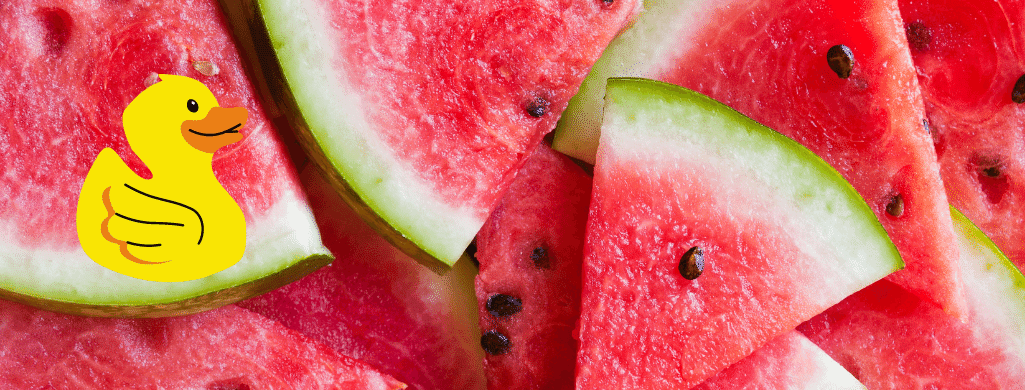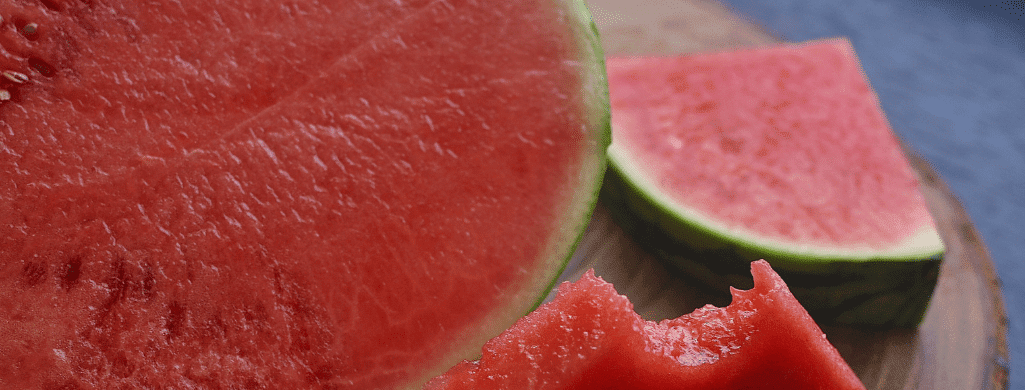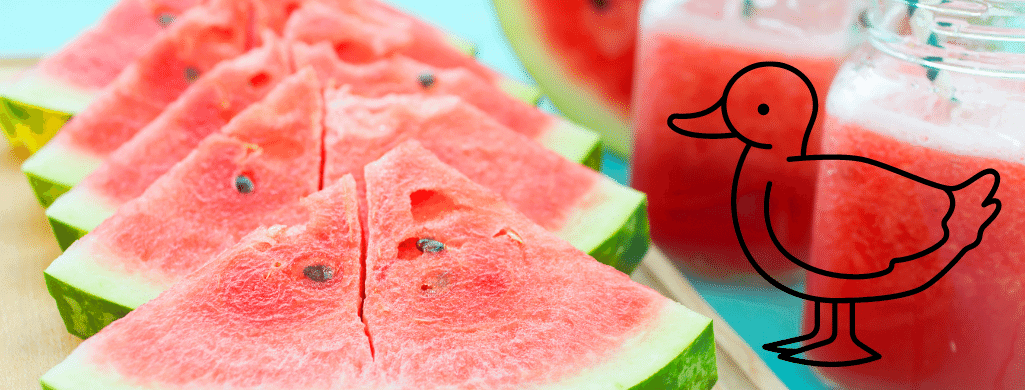A healthy treat is a great way to give your duck some variety in its diet.
Not to mention, safe fruits and vegetables can add a lot of nutrients to their diet. With this in mind, can ducks eat watermelon?
Ducks enjoy a variety of fruits and vegetables as snacks, including watermelon. Ducks can even eat parts of the watermelon humans typically leave behind, such as the watermelon rind. The fruit offers a source of vitamin A and vitamin C to a duck’s diet. With a high water content, it’s hydrating too.
Watermelon can prove a tasty, hydrating, and vitamin-rich snack for your ducks.
Keep reading, and we’ll look at watermelon’s benefits and how it can fit into your duck’s diet!

Table of Contents
ToggleWhat Do Ducks Eat Naturally?
Left to their own devices in the wild, a duck’s daily diet is a bit different from what you might feed one on a farm.
Adult ducks in the wild might snack on:
- Grass
- Aquatic plants
- Seeds or grains
- Fruits and vegetables
- Insects
- Small fish
- Small amphibians
As you’ll notice, a duck’s diet is naturally fairly varied.
So, a tasty watermelon doesn’t stand out too much from what they eat naturally.
After all, they have an affinity for fruits and vegetables, even in the wild.
Related Reading: Do ducks eat frogs?
Why is Watermelon So Good for Ducks?
There are a few reasons duck owners should give watermelons to ducks in reasonable quantities.
This snack for ducks comes with a lot of benefits.
It’s Hydrating
For one, a watermelon is made up of roughly 92% water. This ratio makes it a hydrating snack for your backyard ducks.

A Great Source of Vitamins A and C
In addition, fresh watermelons are excellent sources of vitamins A and C.
In ducks, vitamin A helps your ducks grow up strong and healthy. They’re also bigger than ducks with a deficit of vitamin A.
On the other hand, vitamin C helps to boost the production and even quality of eggs in ducks.
This can help your duck’s heat tolerance, making it a must-have summer snack. It will also help keep your ducks healthy by boosting their immune system.
Full of Antioxidants
When ducks feel what is known as oxidative stress, their bodies produce reactive oxygen. Antioxidants, as the name suggests, can help to bring down oxidative stress in your pet duck.
This boosts immunity and offers higher-quality production of both eggs and their meat if you’re after it.
Providing Potassium
Bananas are well-known for providing plenty of potassium, but watermelons can help this along as well.
Potassium is important for keeping the electrolytes in your body balanced. Otherwise, they can fall, and it can make your duck sick.
Watermelon treats are a great way to boost potassium and maintain an electrolyte balance for domestic ducks, especially as the temperature rises.
They’re Full of Magnesium
Watermelon is also a great way to help meet the magnesium requirements of ducks. In chickens, magnesium helps strengthen egg shells, but ducks have a bit different effect.
These animals naturally have a lower magnesium content in their eggs than their chicken counterparts.
Yet, magnesium is still helpful in preventing stunted growth and helps promote neural functioning as well.
A magnesium deficiency can become so hard on the body of ducks that it can become fatal if not corrected.
Watermelon won’t completely fix the problem, but it can help add a small boost of magnesium to their snacking.

How Do You Feed Watermelon to Ducks?
It depends on how you feed your ducks watermelon. This is fine if you just want to give them the rind rather than the entire watermelon.
They’ll happily take the portion you haven’t eaten of your melon slice.
The flesh of the watermelon is good, too, but you’ll want to break it down into manageable bits.
One easy way to do this is to simply chop up your watermelon. Do this small enough for the bits of the flesh of watermelons to be easy for your ducks to eat.
Add other fruits safe for ducks in the mix to make them a nice fruit salad.
The most important thing is to check your fruit. You don’t want to throw anything spoiled in the mix, like your own bowl of fruit.
This will put your duck’s health at risk.
Can Ducks Eat Watermelon Rind?
As we mentioned, ducks can eat more parts of the watermelon than humans can.
One of the things this means is the green rind you leave behind when you grab a slice of watermelon is a perfectly healthy snack for adult ducks.
Can Ducks Eat Watermelon Seeds?
Similarly to the rind of a watermelon, the seeds don’t need to be removed for adult backyard ducks. Yet, you’ll want to watch how much you feed them.
Watermelon seeds aren’t toxic to ducks. However, they’re still one of the harder parts of the watermelon for these animals to digest.
If you feed your duck too many watermelon seeds, the fruit might give them a stomachache.
If you give your ducks watermelon with seeds, it’s best to give them a place to break the seeds. Otherwise, they’ll struggle to eat them.
What Other Snacks Can You Feed Your Duck?
There are a wide variety of fruits and other snacks ducks can eat. Some of them include the following:
- Melons
- Berries
- Pit fruits
- Cucumbers
- Zucchini
- Chard
- Cabbage
- Sweet potatoes
- Peas
- Broccoli
- Parsnips
- Radishes
- Kale
- Romaine lettuce
- Squash
- Corn
- Strawberries*
Further Reading: Ducks and Strawberries: Is It Really A Good Idea?
What Fruits Can Ducks Not Eat?
When planning a diet for your ducks, there’s also a variety of food you’ll want to avoid at all costs.
These are some of the most common fruits and vegetables dangerous to your ducks:
- Citrus fruits
- Avocados
- Stone fruit pits (mostly in large quantities)
- Spinach
- White potatoes
- Rhubarb
- Eggplant
- Green tomatoes
- Raw beans
Another potentially dangerous fruit is the mango. For some ducks, the treat will make happy quacks.
In some, the fruit can cause symptoms such as an itchy throat. If you’re testing mangos as a treat, start small and watch out for any signs your duck is in discomfort or distress.
Further Reading: Can ducks eat goldfish?
How useful was this post?
Click on a star to rate it!
We are sorry that this post was not useful for you!
Let us improve this post!
Tell us how we can improve this post?
